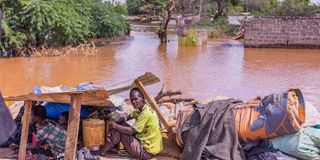Flooding crisis shows dire need for loss and damage

A man and his children, displaced by floods in Garissa County, take shelter from the scorching sun in a makeshift shelter amid the threat of the raging Tana River, which has flooded the estates along its banks in the town.
Kenya is aware of the severe threat posed by the climate crisis. However, the floods which have caused such death and devastation must be a wake-up call to the world on the need for proper financial support to the most vulnerable against such climate impacts.
These floods are exactly what scientists and environmentalists have been warning will come if emissions continue to rise. Some countries are showing the way in reducing fossil fuel use—not least Kenya itself. However, the global energy transition away from coal, oil and gas is moving at a snail’s pace, resulting in the scenes we’ve witnessed in Kenya and Tanzania in recent weeks.
If countries don’t move away from fossil fuels fast enough, then they must take responsibility for the harm their actions cause. Our country is confronted with the sobering reality of grappling with the loss of hundreds of lives with infrastructure worth millions of shillings destroyed and livelihoods wrecked.
But Kenya is only responsible for a miniscule fraction of the carbon emissions fuelling this extreme weather. This shows just how great the need is for proper investment in climate adaptation. Adapting to the climate crisis is now an essential way of life for many Africans, requiring urgent and sustained action at all levels of governance and society.
Policy agenda
Climate adaptation needs to be at the top of the policy agenda. Despite global efforts to reduce emissions, we can expect further events of this nature because the lag in the climate system means it takes years for decarbonisation to take effect.
It’s vital that African governments become world leaders in forward-looking adaptation planning. For us to adequately prepare, we need to know what lies ahead. The government should develop clear action plans and effectively communicate down to the community level. Then, we can empower individuals and communities to improve their resilience in the face of climate shocks such as the current ones.
We must demand that the polluting countries pay up. The “UNEP Adaptation Gap Report 2023” starkly reminds us that climate adaptation is drastically underfinanced with many vulnerable countries ill-prepared to adapt to climate impacts. Let African leaders unite and join other developing countries in the Global South to demand properly funded adaptation finance to implement the necessary changes to protect their most vulnerable citizens.
This year’s UN climate summit, COP29, in Baku, Azerbaijan, has been dubbed the ‘finance COP’ as it will shape the financial framework that will address climate change in the coming years. Our leaders must take proactive steps to ensure they come from this meeting with a solid plan to allocate funds to regions on the frontline of the climate crisis.
Climate change
But it’s not just adapting to current and future events. We also need compensation for the impacts of past events. In the world of international negotiations, this is called ‘loss and damage’ finance. The past weeks have vividly shown just how much losses and damages our country has incurred.
Last year saw the Loss and Damage Fund established, with its first funding. Our leaders need to ensure it is ramped up to meet the growing needs of the victims of climate change effects.
Economic development alone is not enough to deal with the climate crisis; there’s a need for scaled-up international cooperation with the responsible parties ensuring funds are allocated where they are urgently needed to address these severe impacts.
The fossil fuel industry, which has known about their devastating impact on the planet for decades—and the politicians who fail to stand up to the industry—equally have blood on their hands. These corporate behemoths profit at the expense of climate vulnerable countries and it’s time the world forced them to pay to clean up their mess.
Taxing oil profits and funnelling the money into the adaptation and Loss and Damage Fund would be a good place to start.
Mr Adow is the founder and director of Power Shift Africa. [email protected].





